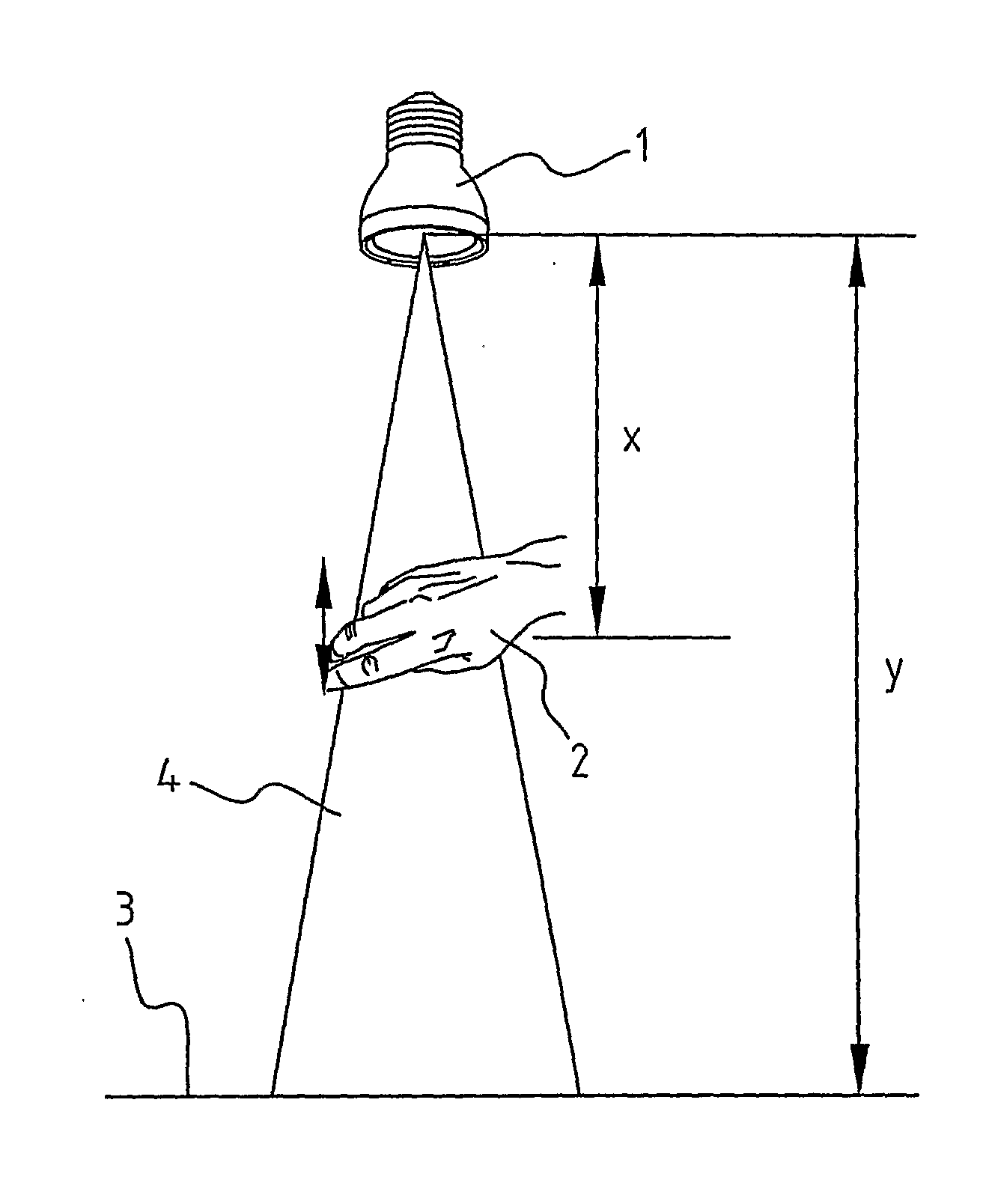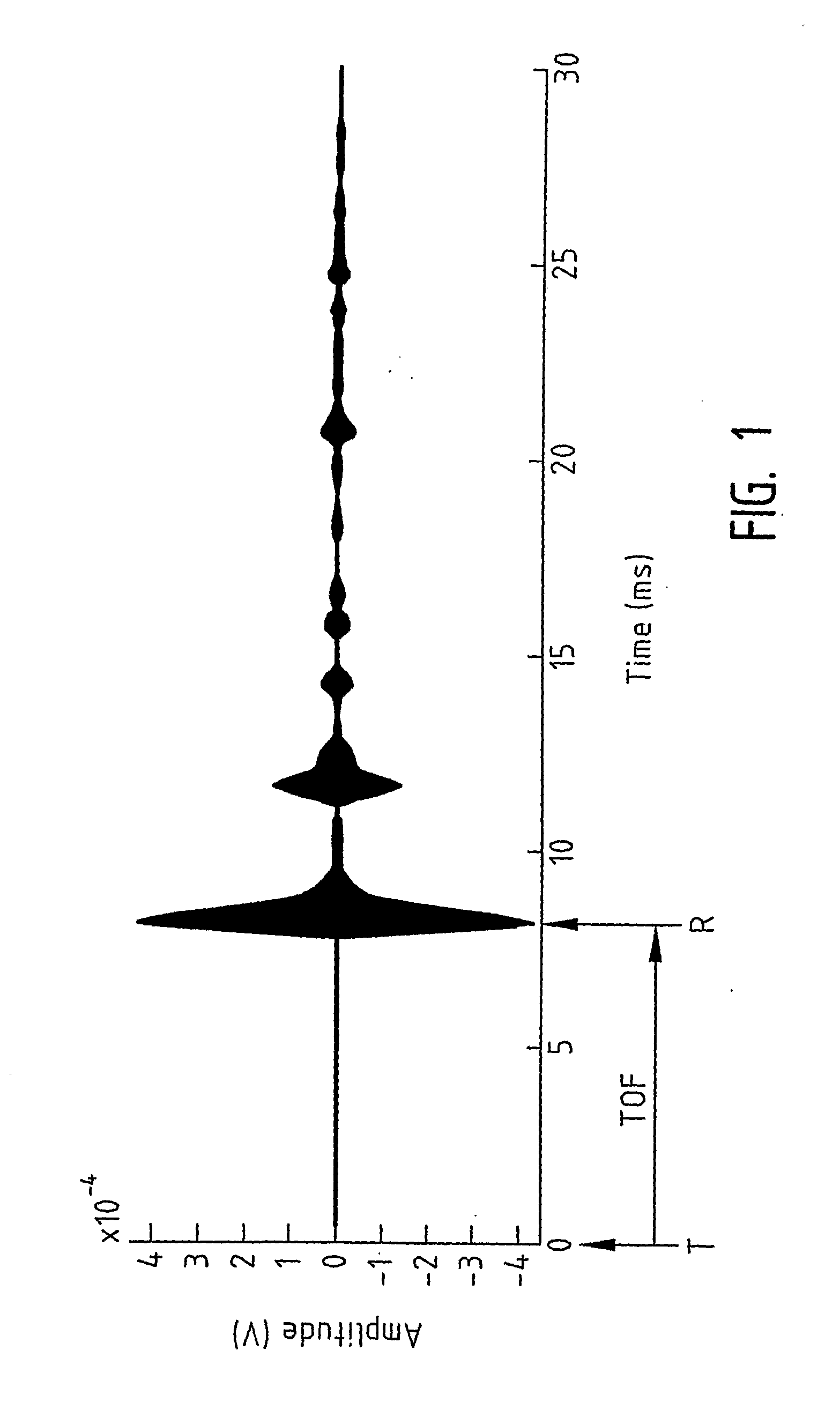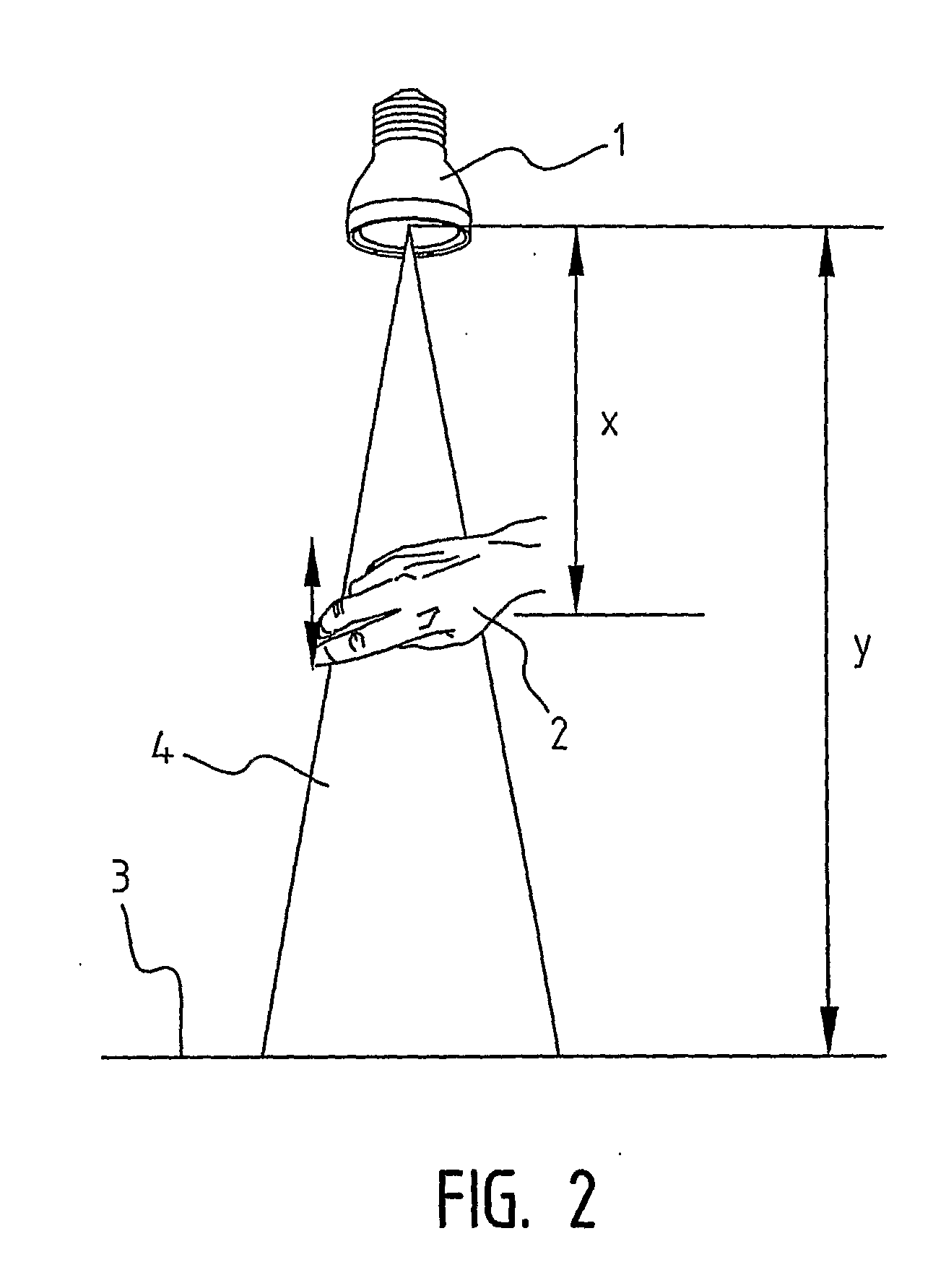Continuous control of LED light beam position and focus based on selection and intensity control
a technology of intensity control and led light beam, applied in the field of lighting systems, can solve the problems of small room needs, inflexibility, and inefficiency, and achieve the effects of low cost, low cost, and easy and accurate measuremen
- Summary
- Abstract
- Description
- Claims
- Application Information
AI Technical Summary
Benefits of technology
Problems solved by technology
Method used
Image
Examples
example 1
[0096]The number of sensors is two, one transceiver (transmitter & receiver) and one receiver.
[0097]The distance in a XY-plane can be calculated as follows:
vair·(TOFT1_R1)t=t0=(x1-x0)2+(y1-y0)2+(x0-x1)2+(y0-y1)2=avair·(TOFT1_R2)t=t0=(x1-x0)2+(y1-y0)2+(x0-x2)2+(y0-y2)2=b
[0098]where vair=speed of sound at room temperature, is 344 m / s.
[0099]To simplify the calculations the sensors are placed in the XY-plane. The receivers are placed so that both are on the X-axis and one on the Y-axis. The only parameter that has to be defined for the sensor units is the distance d, between the sensors. With these assumptions the new coordinates for the transmitter and the receivers become:
[0100]Receivers: R1=(0,0)
R2=(d,0)
[0101]Transmitter: T1=(0,0)
[0102]With the new coordinates above-mentioned expression become much easier to handle:
[0103]for t=t0:
a=2·(x0)2+(y0)2⇒(x0)2+(y0)2=a2b=(x0)2+(y0)2+(x0-d)2+(y0)2
[0104]The object position x0,y0 at t=t0 will be
(x0)t=t0=(a22+d2-b2-a·b)2·d(y0)t=t0=(a2)2-((x0)t=t0)...
example 2
[0109]In order to be able to determine the displacement of the object in the z-direction an additional transceiver is included. Determination of the displacement in the z-direction can be used for additional menu control. In this example one transmitter and three receivers are used, in a configuration as in FIG. 12. The basic principle is the same as in example 1. Time-of-flight measurements are performed on three sensors now instead of two: one transceiver and two receivers.
[0110]Distance calculation can be performed from the transmitter to the object (hand) and from the object to the three receivers by the following equations:
vair·(TOFT1,R1)t=t0=(x1-x0)2+(y1-y0)2+(z1-z0)2+(x0-x1)2+(y0-y1)2+(z0-z1)2vair·(TOFT1,R2)t=t0=(x1-x0)2+(y1-y0)2+(z1-z0)2+(x0-x2)2+(y0-y2)2+(z0-z2)2vair·(TOFT1,R3)t=t0=(x1-x0)2+(y1-y0)2+(z1-z0)2+(x0-x3)2+(y0-y3)2+(z0-z3)2
[0111]These are 3 equations with 3 unknowns. The calculation result is: (x0)t=t0, (y0)t=t0, (z0)t=t0. This is the initial position of the obje...
example 3
[0116]In this example a system with three transceivers is described, in a configuration as in FIG. 12. This provides the possibility to measure the object position three times from different transmitter positions.
[0117]First at t=t0 transmitter T1 will send an acoustic signal to the object. The signal will be reflected at the object and will be received by the three receivers (R1, R2, R3).
vair·(TOFT1,R1)t=t0=(x1-x0)2+(y1-y0)2+(z1-z0)2+(x0-x1)2+(y0-y1)2+(z0-z1)2vair·(TOFT1,R2)t=t0=(x1-x0)2+(y1-y0)2+(z1-z0)2+(x0-x2)2+(y0-y2)2+(z0-z2)2vair·(TOFT1,R3)t=t0=(x1-x0)2+(y1-y0)2+(z1-z0)2+(x0-x3)2+(y0-y3)2+(z0-z3)2
[0118]These are 3 equations with 3 unknowns. The calculation result is [(x0)t=t0]T1, [(y0)t=t0]T1, [(z0)t=t0]T1.
[0119]At t=t1 transmitter T2 will send an acoustic signal to the object. The signal will be reflected at the object and will be received by the three receivers.
vair·(TOFT2,R1)t=t1=(x2-x0)2+(y2-y0)2+(z2-z0)2+(x0-x1)2+(y0-y1)2+(z0-z1)2vair·(TOFT2,R2)t=t1=(x2-x0)2+(y2-y0)2+(z2...
PUM
 Login to View More
Login to View More Abstract
Description
Claims
Application Information
 Login to View More
Login to View More - R&D
- Intellectual Property
- Life Sciences
- Materials
- Tech Scout
- Unparalleled Data Quality
- Higher Quality Content
- 60% Fewer Hallucinations
Browse by: Latest US Patents, China's latest patents, Technical Efficacy Thesaurus, Application Domain, Technology Topic, Popular Technical Reports.
© 2025 PatSnap. All rights reserved.Legal|Privacy policy|Modern Slavery Act Transparency Statement|Sitemap|About US| Contact US: help@patsnap.com



